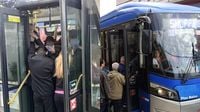On the morning of Monday, April 28, 2025, a sudden strike at the Viação Sambaíba bus garage in the Tremembé neighborhood of São Paulo caused major disruptions for thousands of commuters. The strike began around 3:50 AM, halting the operations of 39 bus lines that serve the northern zone of the city, leaving many passengers stranded and creating long queues at bus stops.
The São Paulo Transport Authority (SPTrans) reported that the situation began to normalize shortly before 6:00 AM, with gradual bus departures resuming from the garage located on Rua Maria Amália Lopes de Azevedo. However, by 7:30 AM, passengers still faced significant delays, with some waiting over two hours to board buses.
SPTrans confirmed that Viação Sambaíba would be fined for the disruption, which was described as a failure to provide an essential service without prior notice. In an official statement, SPTrans lamented, "It is regrettable that the population is harmed without the provision of essential service and without any prior warning." This incident highlights the ongoing tensions between transport workers and management, particularly regarding communication and labor relations.
The strike was unexpected, with Viação Sambaíba stating that it was a unilateral action by one of the directors of the drivers' union, not involving the broader union membership. The company expressed surprise at the suddenness of the strike and emphasized that their operations had returned to normal.
As the day progressed, the impact of the strike was felt acutely at the Terminal Santana, a major transport hub in the northern zone. Passengers relying on routes such as the 106A, connecting Santana to Itaim Bibi, and the 175T to Jabaquara, reported extensive delays and overcrowding. Social media was flooded with complaints, with one user posting, "Where are the 106A buses? It’s 5 AM and there are huge lines at the terminal!"
The lack of official communication from Viação Sambaíba during the early hours of the strike exacerbated frustrations, leaving many commuters without immediate alternatives. The northern zone of São Paulo is densely populated, with neighborhoods like Vila Maria, Tucuruvi, and Jaçanã heavily reliant on public transportation. The interruption of these 39 lines not only disrupted daily commutes but also affected access to essential services and workplaces.
SPTrans activated the Company Support Plan in Emergency Situation (Paese) to alleviate the impact, deploying substitute buses to cover affected routes. Despite these efforts, many passengers still reported critical shortages of available buses, leading to overcrowding and long waits at bus stops.
The incident reignited discussions about the relationship between transport companies, unions, and public administration in São Paulo. Viação Sambaíba has faced similar issues in the past, notably a surprise strike in February 2023 that affected 41 lines, and another in September 2020, which delayed 43 lines. These recurring labor disputes raise questions about the effectiveness of measures in place to prevent such disruptions and ensure continuity of essential services.
The SPTrans has indicated that the Sambaíba will face administrative penalties for failing to comply with contractual obligations, which include guaranteeing continuous operation. Additionally, SPTrans plans to file a police report regarding the incident, seeking accountability for the disruption caused.
The absence of prior notice for the strike violated Brazilian law, which mandates that essential services must be announced 72 hours in advance before any interruption. This lack of communication has drawn severe criticism from the public, emphasizing the need for better dialogue between the transport company and its workers.
In response to the strike, the SMT (Secretariat of Urban Mobility and Transportation) has pledged to enhance oversight of transport companies and improve communication channels with unions. The objective is to create a more transparent negotiation process that could prevent future conflicts and ensure that commuters are informed promptly about service interruptions.
With a daily ridership of approximately 2.5 million passengers relying on public transport in São Paulo, the stakes are high for both the operators and the city. The Viação Sambaíba operates around 1,200 buses and is responsible for a significant portion of the transport network in the northern zone. Recent investments, including the introduction of 100 electric buses in 2025 and the expansion of dedicated bus lanes, aim to improve service reliability and efficiency.
However, the repeated occurrences of strikes highlight the ongoing challenges within the public transport system, particularly regarding labor relations and operational management. The Sambaíba garage, where the strike originated, is strategically located to serve a high-demand area but has also become a focal point for labor disputes.
As São Paulo continues to grapple with its public transportation challenges, the recent strike serves as a reminder of the urgent need for reforms. Ensuring reliable transport services is crucial not only for commuters but also for the economic vitality of the city. The SMT's commitment to enhancing communication and preventive measures will be essential in fostering a more stable and efficient public transport system.
In summary, the disruptions caused by the Viação Sambaíba strike on April 28 underscore the complexities of managing public transportation in a sprawling metropolis. The need for effective communication, proactive labor relations, and continuous investment in infrastructure is clear. As the city moves forward, the lessons learned from this incident will hopefully pave the way for a more resilient and responsive public transport system.




